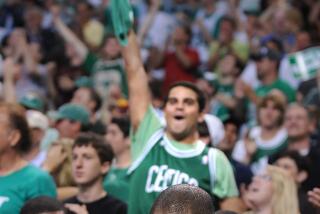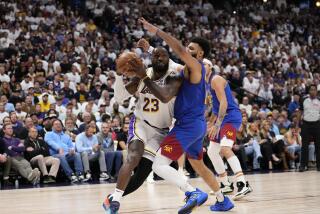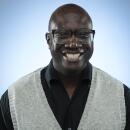Series gets serious as Lakers prepare for Game 3
- Share via
Reporting from Boston -- Lakers assistant coach Frank Hamblen stood outside his team’s coaches’ office Sunday night after Game 2 of the NBA Finals, his game notes in a folder tucked under his arm, as player after player solemnly eased his way out of a quiet locker room.
The Lakers had just lost, 103-94, to the Celtics, and in the process lost home-court advantage as the best-of-seven series that is knotted at 1-1 shifted to Boston for Games 3, 4 and 5.
Hamblen, in charge of putting the Lakers’ game plan together against the Celtics, was emphatic when he described what the Finals now have become.
“We’ve got a serious series now,” Hamblen said, chuckling.
And what if the Lakers and their fans didn’t know that already?
“Well, they know it now,” Hamblen said, smiling.
When Hamblen turned serious, he pointed out how the Lakers refused to move the ball through the “air” in the Game 2 loss, which just made Boston’s defense that much better.
The Lakers had only 18 assists Sunday.
Boston’s point guard, Rajon Rondo, had 10 assists all by himself.
“We dribbled the ball way too much instead of passing the ball,” Hamblen said. “We dribbled, dribbled, dribbled.”
That allowed the Celtics to load up on defense and limit the Lakers to 40.8% shooting and 22.7% (five for22) from three-point range.
“You have to give them credit,” Hamblen said. “They got their split. They accomplished what they wanted.”
Hamblen said the Lakers would watch film Monday before they boarded their flight for Boston.
He’ll have several things to preach to the Lakers.
Better ball movement.
“We have to swing the basketball by the pass and not the dribble,” Hamblen said.
Pound the ball inside to Pau Gasol and Andrew Bynum.
Gasol and Bynum were too much for the Celtics, combining for 46 points on 13-for-20 shooting. But the Lakers went away from the big men in the fourth quarter. Gasol and Bynum combined for only five points and got off a combined three shots in the final quarter.
“We’ve talked about winning the trench game, the post-up, rebound game,” Hamblen said.
Be efficient on offense.
The Lakers had only 26 points in the paint Sunday, which showed a lack of aggressiveness. And they scored only four points in the final 5 minutes 21 seconds.
“I thought our offensive inefficiency allowed them to be a transition team, especially in the first half,” Hamblen said.
As for the Celtics, Hamblen said they had to like what they did.
Boston shot the ball exceptionally well from three-point range (68.8%), had 13 offensive rebounds and 13 second-chance points, this after getting zero in Game 1.
“They are a veteran team over there,” Hamblen said. “They obviously know how to play.”
Boston also caught the Lakers too often in a transition defense.
Rondo got loose to run things and created problems for the Lakers. The Celtics also outrebounded the Lakers, 44-39.
“Rebounding had been one of their weaknesses,” Hamblen said. “But they beat us on the boards [in Game 2]. That always has been a strength of ours, so we have to reverse that trend.”
twitter.com/BA_Turner
More to Read
All things Lakers, all the time.
Get all the Lakers news you need in Dan Woike's weekly newsletter.
You may occasionally receive promotional content from the Los Angeles Times.











